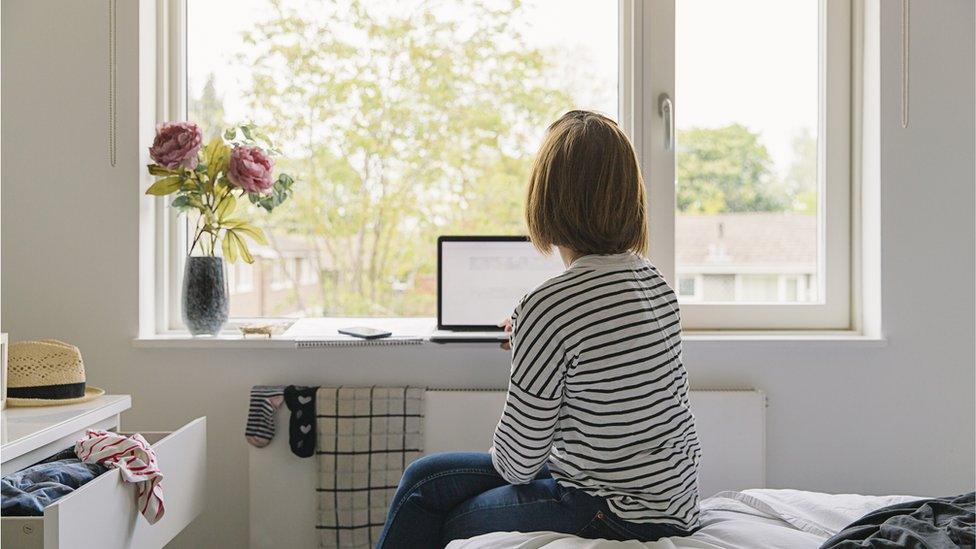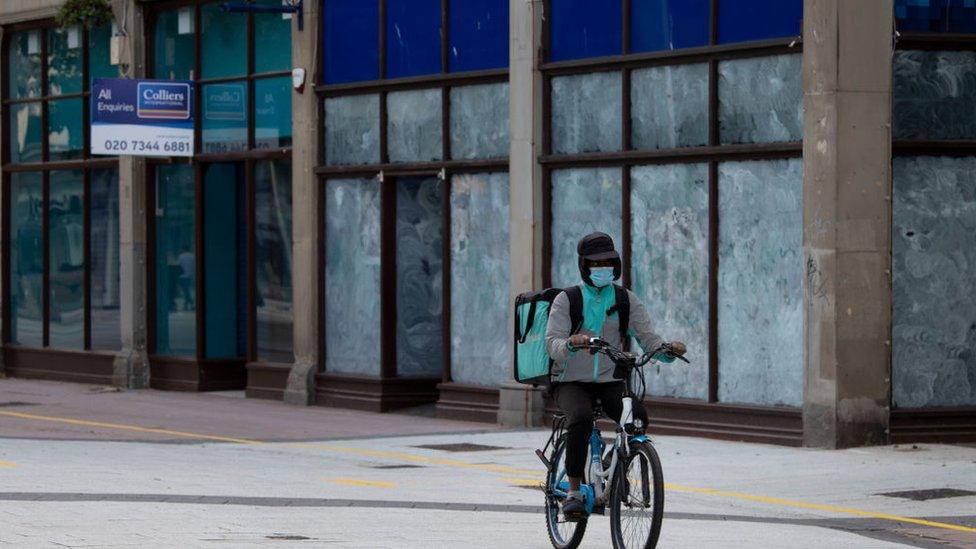Coronavirus: 'Nine in 10 would continue working from home'
- Published

A survey suggests the majority of people working from home are as productive, if not more
Nine in 10 workers who have worked from home during lockdown would like to continue in some form, researchers say.
A report by academics at Cardiff and Southampton universities suggests the majority of people working from home are as productive, if not more.
Thousands of people were surveyed three times between April and June.
The Welsh Government said people would continue to be advised to work from home, despite a UK government campaign to get workers back into offices.
Business leaders have expressed fears over city centre economies.
Homeworking has rocketed since the start of lockdown - rising from 6% of employees before the pandemic to 43% in April this year.
"Our analysis suggests there will be a major shift away from the traditional workplace, even when social distancing is no longer a requirement," said Prof Alan Felstead, of Cardiff University.

City centres will face a damaging time if people do not return to office working, the CBI has warned
Each survey questioned a representative sample of between 6,000 and 7,000 workers who had worked at least one hour in the week before the interview. It found:
Almost 90% would like to continue working from home in some capacity, with almost half wanting to work at home often or all of the time
More than 40% said they were able to get as much work done while working from home compared to six months earlier, when most were working outside of the home
Almost 30% believed they got more work done at home, but 30% also said their productivity had fallen
Those who spent all of their time working from home reported an increase in productivity
"What is particularly striking is that many of those who have worked at home during lockdown would like to continue to work in this way, even when social distancing rules do not require them to," Prof Felstead added.
"These people are among the most productive, so preventing them from choosing how they work in the future does not make economic sense."

A government campaign will ask employers to reassure employees it is safe to return to the office
The Understanding Society Covid-19 Study, external, which its authors claim is the first analysis of employee survey data focusing on homeworking, is published as the government prepares to encourage people back to the office.
The campaign, to start next week, will ask employers to reassure staff it is safe to return by highlighting measures taken to prevent the spread of Covid-19.
The CBI has warned city centres could become "ghost towns" if the prime minister does not do more to encourage workers to go back to the office.

The change to homeworking "provides an opportunity for us to radically rethink our city centres as multi-use places", the co-author of the report claims
"City centre high streets have been hard hit by the pandemic and are likely to remain quiet for some time to come as fewer people return to traditional places of work," said co-author Dr Darja Reuschke, of the University of Southampton.
"However, this also provides an opportunity for us to radically rethink our city centres as multi-use places that accommodate different kinds of economic uses and are not built around fast roads that connect workplaces with residences."
A Welsh Government spokesman said: "In Wales, we continue to advise people to work from home where possible.
"We recognise, however, that there will be situations where there is a pressing organisational need for employers to ask staff to return to an office, or where employees feel working from home is impairing their wellbeing.
"Employers are under a duty to take all reasonable measures to minimise the spread of coronavirus, which will include ensuring they do not require staff to return to workplaces in the absence of a clearly demonstrated business need."
- Published26 August 2020

- Published6 July 2020

- Published25 July 2020
